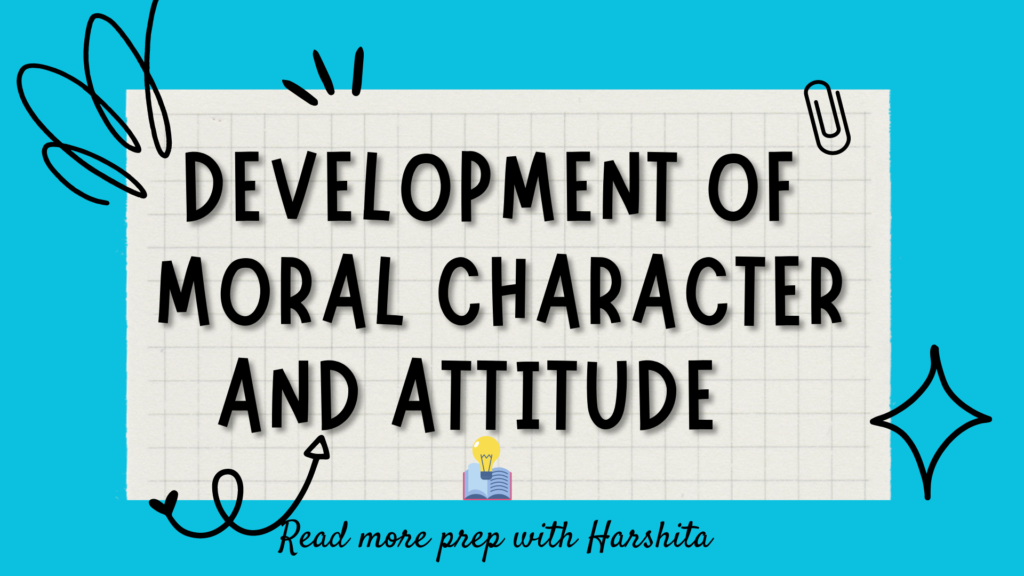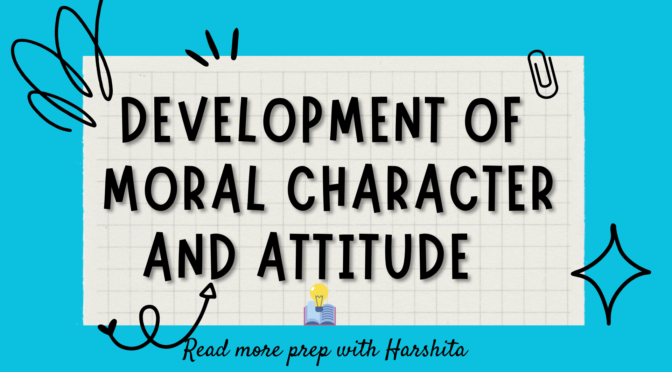Morality refers to the principles or standards of behavior that are considered to be right or wrong by a particular society, group, or individual. Development of Moral character and attitude is important in value education. It is the set of rules that governs how people should behave towards each other and the world around them. Moral judgment refers to the process of evaluating an action or behavior based on these principles or standards.
The concept of morality is complex and multifaceted, with different philosophical, religious, and cultural traditions offering their own interpretations and understandings.
However, some common themes and ideas that are associated with morality include:
- Ethics: Morality is often associated with ethics, which refers to the systematic study of moral principles and values.
- Virtues and vices: Morality is often concerned with promoting virtues (such as honesty, integrity, and compassion) and avoiding vices (such as greed, selfishness, and cruelty).
- Obligations and duties: Morality often involves a sense of obligation or duty to others, as well as a responsibility to act in ways that promote the common good.
- Consequences: Morality is often concerned with the consequences of our actions and the impact they have on ourselves and others.
- Social norms: Morality is often shaped by social norms, which are the unwritten rules that govern how people should behave in a particular society or culture.
Moral judgment, on the other hand, involves evaluating an action or behavior based on these principles or standards. Moral judgment can be influenced by a variety of factors, including personal values, cultural norms, social pressures, and emotional responses.
There are various theories and models of moral judgment, each of which provides a different perspective on how people make moral decisions. Some of the most prominent theories include:
- Kohlberg’s stages of moral development: This theory proposes that moral reasoning develops through a series of stages, with each stage building on the previous one.
- Social intuitionism: This theory proposes that moral judgments are primarily based on emotional responses and intuitions, rather than conscious reasoning.
- Moral pluralism: This theory proposes that there are multiple, conflicting moral principles and values that are equally valid and that moral judgments involve balancing these different values.
- Virtue ethics: This theory emphasizes the importance of cultivating virtues and character traits, rather than focusing on rules or principles.
In conclusion, the concepts of morality and moral judgment are complex and multifaceted, with different philosophical, religious, and cultural traditions offering their own interpretations and understandings. However, some common themes and ideas that are associated with morality include ethics, virtues and vices, obligations and duties, consequences, and social norms, while moral judgment involves evaluating an action or behavior based on these principles or standards.
Attitude is an individual’s learned tendency to evaluate and respond to an object, person, or situation in a positive, negative or neutral way. It is an integral part of one’s personality that influences behaviour and choices. Attitudes play a crucial role in value education as they are the foundation of value formation and ethical behaviour.
The development of attitudes in value education can be fostered through various methods:
- Role Modelling: Teachers and parents act as role models for children, and their actions and behaviours can influence the attitudes of children. Therefore, teachers and parents should set an example of moral behaviour, ethical conduct, and a positive attitude towards life.
- Discussion: Classroom discussions on moral and ethical issues can help students develop an attitude of critical thinking and reflection. It encourages them to explore different perspectives, empathize with others, and make informed decisions.
- Experience: Exposure to real-life experiences can help students understand the consequences of their actions . It also develop a positive attitude towards others. Field trips, community service, and volunteering can expose students to different people and situations, developing empathy, and positive attitudes.
- Self-reflection: Students should be encouraged to reflect on their behaviour, actions, and emotions. Through self-reflection, students can identify their strengths and weaknesses, acknowledge their biases and prejudices, and work towards improving their attitudes and behaviours.
- Positive Reinforcement: Teachers and parents should reinforce positive attitudes and behaviours. Praising good behaviour, rewarding positive attitudes, and acknowledging efforts can motivate students to develop and maintain positive attitudes.
- Values clarification: Value clarification exercises can help students identify their values and develop a personal code of ethics.
Also Visit : Prep with Harshita

Also Read : Role of Media in developing values


25 thoughts on “Development of Moral Character and Attitude”